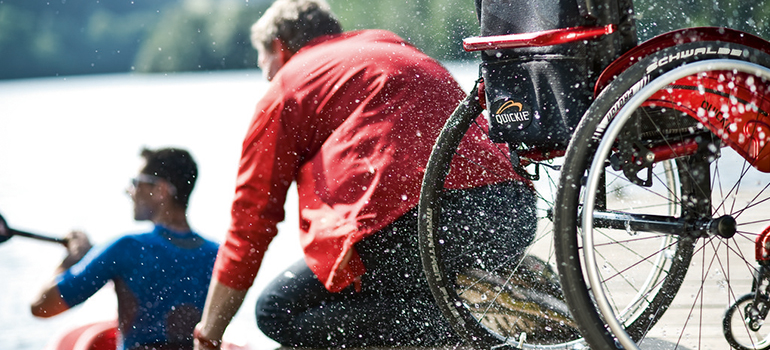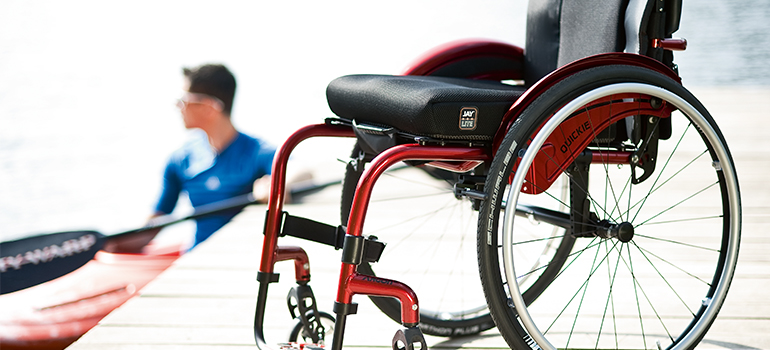Share:
Take it offline!
This Education in Motion resource is also available as a printable PDF.
Download PDF
Adventure sports for people with disabilities
Adventure sports and disability are not incompatible. Actually, with adaptations of kit and the help of qualified professionals, people with disabilities can participate in canyoning, skydiving, hiking, rafting or caving in a totally safe manner.
These types of activities present a considerable challenge for people with disabilities and are recognised as an effective way to keep fit and raise self-esteem.
In this article, we will discuss several adventure sports that are accessible to everyone.
Which adventure sports can people with disabilities practice?
Practicing sport increases quality of life and allows us to enjoy our leisure time in a positive and healthy way. That’s why one of the toughest challenges of companies that organise adventure sports is to enable people with disabilities to feel the least excluded as possible. Many of these companies join forces to adapt their activities for everyone, regardless of whether they have physical or sensory disabilities or not.
As a general rule, “aerial” adventure sports, (such as ballooning, skydiving or paragliding) can be performed by people with disabilities without too many problems, providing that a qualified guide or pilot is on hand to help and any related equipment has been adapted accordingly.
Other sports, such as adapted diving can also be practiced by people with disabilities with no problems. In fact, adapted diving is a very beneficial activity that helps to burn calories, improve cardiovascular and respiratory health and allow disabled sports people to exercise their entire range of muscles under water in exactly the same conditions as the rest of the divers. In this sense, diving is a group activity that promotes collaboration and team work.
Kayaking or sailing are also fairly accessible adventure sports for people with disabilities. They can also enjoy “multi-adventure” mountain activities. In recent years, adapted hiking routes are becoming more and more popular, and there are even companies that organise rafting, skiing and sailing, etc., specifically for people with physical or sensory disabilities.
Ideas | Adventure sports for people with disabilities

Canoeing and kayaking
Canoeing can be practiced by a wide range of people with different disabilities, such as cerebral palsy, spina bifida, spinal cord injuries, amputations and multiple sclerosis. There are various clubs around the UK, such as Canoe London that offer these types of sports for people with disabilities.
Furthermore, there are different watercrafts that have been adapted for any type of disability, including rafting and kayaking. The clubs and associations that offer these courses or organise such activities all have adapted kit and equipment available for anyone (helmets, lifejackets, oars, etc.). A good example is the Calvert Trust who offer a wide range of activities for people with disabilities in various regions across the UK.
Hang gliding and paragliding
Hang gliding and paragliding are also accessible adventure sports for people with disabilities. These sports are usually carried out in tandem mode, in which the person with the disability is accompanied by a professional that helps them at the beginning and end of the activity.
There are currently several hang gliding and paragliding schools that offer these experiences in a way that makes them accessible to everyone.
You can find more information regarding these sports on the British hang gliding and paragliding association website.
Hiking
The UK has numerous accessible hiking routes that can be traversed in a wheelchair, and in each of its National parks there are trails that have been adapted specifically for people with disabilities. This is a great way to keep in touch with nature while practicing a sport.
The main advantage of this sport is that anyone can do it and it hardly requires any kit adaptations. The more “adventurous” and experienced can choose longer more complicated routes while those who are just starting out in the sport can choose more straightforward group excursions.
Adapted mountain sports: canyoning, abseiling and climbing for people with visual disabilities
Canyoning is a sport that involves the progression through canyons or ravines, flood channels or Mountain Rivers. Abseiling is a sport that involves descending rapidly down vertical walls by sliding down a rope that is attached to the body. Finally, climbing consists of ascending or descending rock walls or natural obstacles.
All of these activities require different techniques and equipment and must be supervised at all times by professionals that have an in-depth knowledge of the sport and terrain.
Experience days are also becoming increasingly popular, Ablenet offering experiences that have been handpicked by the disabled for the disabled for activities such as Ifly or supercar experiences.
The adaptations for people with visual impairments are minimal, and there are several associations that organise these types of activities. There are even athletes with disabilities who have realised important achievements in these disciplines.
For more information on the sports mentioned in this article and numerous others, please visit the Disability Directory of Information and in particular the Activity Centres for the Disabled and Special Needs.
Having a disability does not mean you have to stop being adventurous, if you have a thirst for thrills take advantage of the sports and adventure activities that are on offer to you. If you want to know more about adapted adventure sports, subscribe to our newsletter to keep updated of any new developments.

Fancy being an adrenaline junkie in one of our wheelchairs? Take a look at our “sports wheelchair QUICKIE”.
Pictured Argon 2: The fully adjustable lightweight active wheelchair. It's the ideal adaptive wheelchair for users who are developing their driving capabilities over time and require more active wheelchair settings.